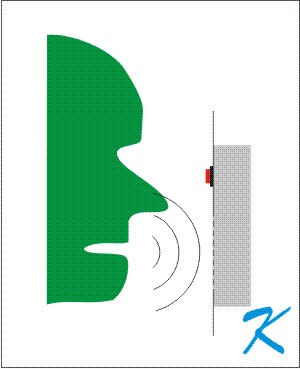Recording a Message in a Place-of-Refuge or in an Elevator
A place of refuge, a stairwell, or an elevator is a bad place to make a recording, but the recordings have to be made there. To sound good, put your mouth about three finger widths from the microphone and speak slowly and distinctly.
When making a recording in an elevator or stairwell, get close to the microphone so the microphone will pick up your voice up better than the room reverations.
OK. You've installed a message box in the
place-of-refuge or in the elevator, and now you have to use your voice to record the emergency message. The message is to make sure that someone having a real emergency - even though they may be panicking - will be able to correctly get their location across to emergency responders.
Recording Conditions
When making the recording, there are things to take into consideration.
- For the person pressing the button, this is an emergency situation
- When the connection is made with the monitoring company, the operator usually isn't ready: pencil and paper isn't already in their hand
- You are in one of the worst sounding recording booths on earth
- You have to invent the script from scratch, but the message has to contain all the proper information
Emergency Situation
The person pressing the button:
- May be in a panic and not be able to explain clearly where they are
- May not speak the language or speaks with a heavy accent
- May not be able to speak or hear at all
You have to speak for that person.
Get the Emergency Responders Attention
The operator on the other end of the line is not sitting on pins and needles waiting for the call, the person on the other end of the line is getting pen and paper ready while the message has already starting.
Start out the message with something unimportant like
"This is a call from a place of refuge" or "This is an emergency call from an elevator". The operator already knows this, but starting out the message with an unimportant statement like this gives the operator at the monitoring company time to get ready to write down the message.
Bad Recording Booth Acoustics
Yes, this is a recording booth. It doesn't look like one, but this is where you are and you are making a recording. That makes the hallway, the elevator, or the stairwell you're in a recording booth.
This recording booth is also an echo chamber. If the recording is made in the hallway, the sound is bad, the elevator is worse, and the stairwell is absolutely horrible. You are recording all sound in the recording booth and if you want to be understood, you have to overcome the echoes in the recording booth.
Yes, at the monitoring company, they have a recorder and can play back the message several times to make sure they understand it. However if the operator has to play back a message because it's hard to understand, precious seconds to minutes are lost. You want the operator to understand the message the first time.
What makes the message hardest to understand is there are a lot of echoes. In essence the sound of your voice bounces off the walls repeatedly; the accumulated echoes from all this bouncing around are actually louder than your voice. Overcoming the echoes, however, is rather easy.
These recording machines have what's called Automatic Gain Control (AGC). This means that no matter how loud or quiet you talk into the mic, the recorder will always record your voice at the proper volume level.
In order to record your voice louder than the echoes, put your mouth 3 finger widths away from the built in microphone in the message box. Talk loud, loudness doesn't matter; the ACG will adjust the record volume automatically and make a good recording.
The echoes are just as loud as before, but when your mouth is that close to the microphone, your voice is a lot louder than the echoes.
Invent the Script and Stick to It
You, like most of us, don't have perfect recall of what you need to say.
The easiest way to make sure all the information in the message is correct, create a script. Say out loud what is written down several times. Do this before making the recording.
But before making the script, call the monitoring company. Ask an operator what should be included in the message, and in what order. Keep the message short, but make sure everything that should be included is in the script.
Emergency Call
Remember, no one is going to grade you. No one is even going to know (or care) whose voice it is on the recording. All that anyone cares about is that the message is understood in its entirety.
Your job is to make a recording that the operator can understand:
- You're recording the location message for the person having an emergency
- The operator or emergency responder needs to get ready for the message
- You have to overcome the bad acoustics in the recording booth
- There needs be a script so all necessary information is in the message
